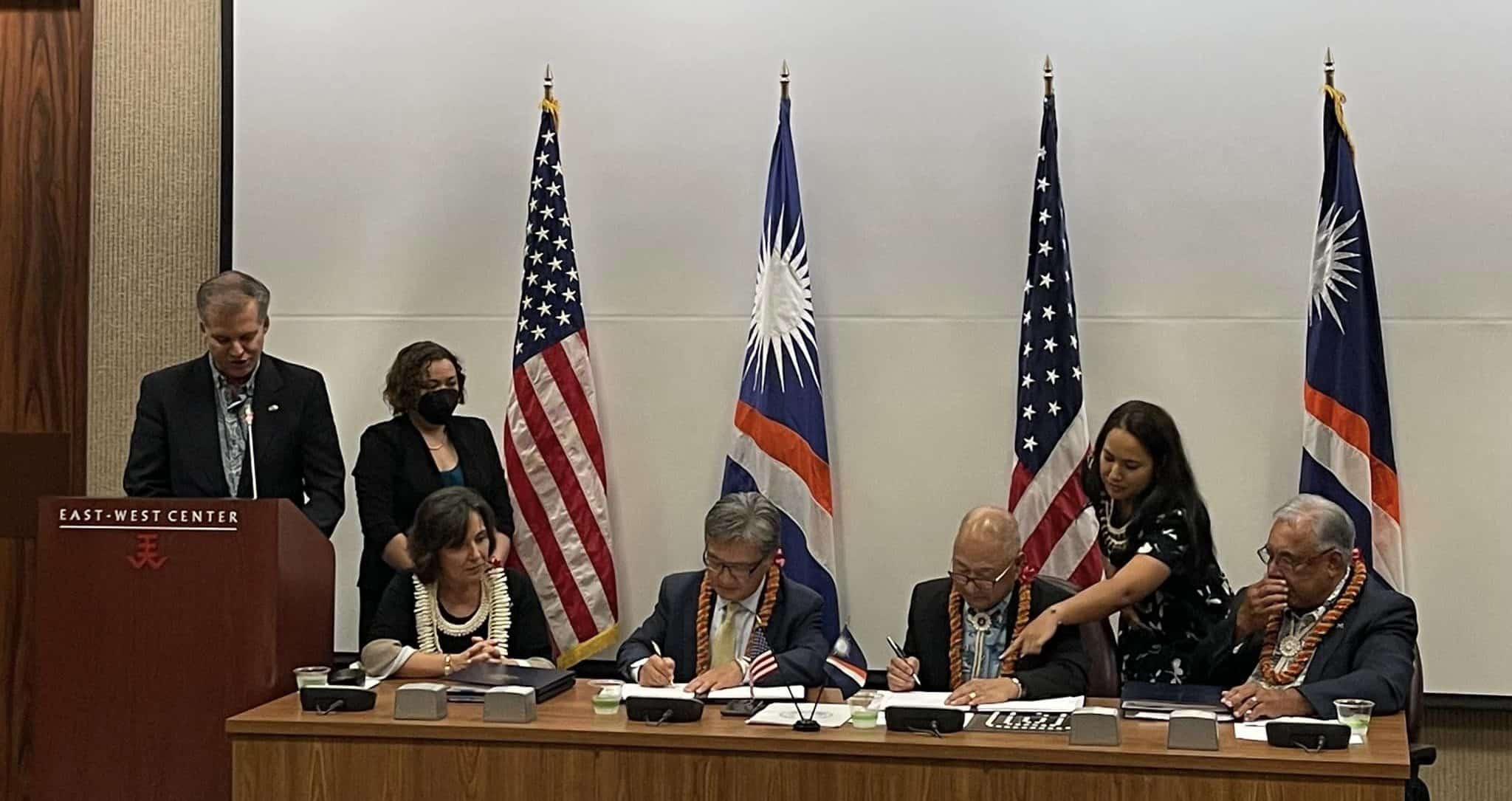The Republic of the Marshall Islands and the U.S. signed agreements Monday that will give Washington a stronger presence in the Western Pacific and the right to deny China and other nations access to the islands’ territorial waters.
The agreements put in place Washington’s offer to provide US$2.3 billion in economic assistance to the Marshall Islands over 20 years. In exchange, Washington will be able to deny access to the 2.1 million square kilometers surrounding the Marshall Islands.
When that is combined with the waters and airspace of the U.S. Pacific territories of Guam and the Northern Marianas, the U.S. military will gain control over a vast sector of the Western Pacific at a time when China is attempting to expand its influence over the region.
“This is an important investment in our shared Pacific future,” said Carmen Cantor, assistant secretary for insular and international affairs at the Department of the Interior, in remarks before the signing at the East-West Centre in Honolulu, an event that was closed to the press.
“Enhancing our special relationship with the Marshall Islands is a critical part of our efforts, and we look forward to taking many more steps together in the future,” Cantor said in the statement.
The agreements “are critical to all of our countries and to a continued free and open Pacific based on shared values,” said Congressman Ed Case, who attended the signing ceremony in Honolulu. “I was honoured to join,” Marshall Islands and U.S. officials, “for the signing of our renewed Compact of Free Association between the U.S. and the RMI,” he said.
Photos that Case posted on his Facebook account showed that Marshall Islands President David Kabua was present at the ceremony along with Foreign Minister Jack Ading and the U.S. chief compact negotiator Joseph Yun.
“All signed,” Yun said, “I hope they [the agreements] will be enacted soon” by Congress, he said.
The Marshall Islands are the last of the three so-called Freely Associated States to reach final implementing agreements with Washington. The Republic of Palau and Federated States of Micronesia (FSM) signed their parallel agreements with Washington in May.
But the Marshall Islands wanted specific funds to address the environmental and health impacts of 67 U.S. atmospheric nuclear weapons tests between 1946 and 1958. Island residents face elevated cancer rates, among other health issues.
Environmental concerns include radioactive soil, dying coral reefs and a loss of biodiversity, according to a 2012 United Nations report.
The agreements signed Monday between the Marshall Islands and the United States do not contain any reference to additional funds to address the impacts of U.S. nuclear testing on the Marshallese people.
“Obviously, there’s no secret that lawyers [in the U.S. government] are concerned about issues of liability. And that’s understandable,” said John Hennessey-Niland, who served as the U.S. ambassador to Palau between 2020 and 2022.
In an interview with VOA, Hennessey-Niland said the nuclear details are important to the Marshallese, and Washington needs to demonstrate its commitment to the region by finalizing these agreements.
“[This] signals not just to the people of Marshall Islands, but to the people of the Pacific, that we should be their partner of choice,” he said.
Since President Xi Jinping took office in 2013, “Beijing has significantly bolstered its involvement in the Pacific Islands region, which comprises three U.S. territories and three countries freely associated with the United States that are important for U.S. defence interests in the Indo-Pacific,” according to a 2018 report by the U.S.-China Economic and Security Review Commission.
“Much of China’s engagement in the region has focused on expanding economic ties with the Pacific Islands, but it has also increased its footprint in the diplomatic and security realms.”
For the past 10 years, Beijing has exerted economic and political pressure on the governments of the Marshalls and Palau because both Pacific Island nations recognise Taiwan diplomatically. Beijing considers the self-governing island as its own territory.
Palau President Surangel Whipps Jr told VOA that he’s under constant pressure from Beijing.
“We’ll give you a million tourists [and] we can [fill] all the hotel rooms you want. All you have to do is denounce Taiwan and join us,” he said, paraphrasing the messages he receives.
With the agreement signed with the Marshall Islands, the U.S. Congress must begin the process of approving the funds for all three Pacific Island nations. The Biden administration is seeking US$7.1 billion to fund the package for all three nations – known as the Compacts of Free Association – over the next 20 years.
The House Natural Resources Committee has scheduled a subcommittee hearing on the agreements with the nations on Thursday to consider draft legislation. Ambassador Joseph Yun, U.S. special presidential envoy for compact negotiations, and Cantor are expected to testify.
Unlike the underlying agreements signed Monday, the draft legislation being considered by the committee includes compensation for nuclear testing for the Marshall Islands. According to the documents, the draft limits compensation for American nuclear testing to “the people of” four of the 29 atolls within the Marshall Islands where a majority of the nuclear testing took place “and their descendants.
